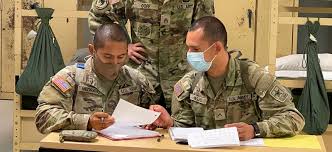The army is an integral part of any nation’s defense system. It is responsible for protecting the country from external threats, maintaining peace and order, and ensuring that the country’s safety and security are not compromised. The army also plays a major role in providing aid to communities during times of natural disasters and other emergencies.
The members of the army are highly trained professionals who have sworn an oath to serve their country with honor and integrity. They are expected to display exemplary courage, loyalty, and dedication in their service to their nation. The army is composed of several branches, such as the infantry, cavalry, artillery, engineering corps, signal corps, medical corps, and air force. Each branch has its own specialized tasks that it must carry out in order to fulfill its mission.
In addition to its primary mission of defending the nation from external threats, the army also plays an important role in promoting national unity. Through military exercises and drills conducted on a regular basis, the army helps foster a sense of camaraderie among its members while instilling discipline and respect for authority figures. This helps strengthen national cohesion by bringing together people from diverse backgrounds who share a common goal of protecting their homeland.
The army is also responsible for providing humanitarian assistance in times of natural disasters or other emergencies. During these times, soldiers are often deployed to provide medical aid or food supplies to affected areas. They also assist in restoring infrastructure damaged by natural disasters such as floods or earthquakes.
The army plays an important role in maintaining peace and stability both within a nation’s borders as well as across international boundaries. By engaging in peacekeeping operations around the world, they help ensure that conflicts do not escalate into full-scale wars that can have devastating consequences for all involved parties.
Overall, the importance of the army cannot be overstated as it serves a vital purpose in keeping our nations safe from external threats while promoting national unity and providing humanitarian assistance when needed most.
The eight benefits of joining the army:
- Develops Discipline
- Teaches Leadership
- Provides Education Opportunities
- Offers Job Security
- Encourages Physical Fitness
- Promotes Global Awareness
- Provides Job Training
- Promotes Personal Growth
The 5 cons of army’s
- Risk of Injury or Death
- Separation from Family
- Limited Personal Freedom
- Financial Stress
- Lack of Job Security
Develops Discipline
Joining the army is an important step for many, as it not only provides them with a career but also helps to develop discipline. Being part of the armed forces requires a high level of commitment and dedication to follow orders and regulations. This instills a sense of responsibility in soldiers, encouraging them to be more disciplined in their day-to-day lives.
The discipline that comes with being a soldier helps to prepare individuals for the future, teaching them valuable life skills such as self-discipline, self-motivation and problem solving abilities. As well as providing a sense of purpose and direction, these skills can help lead to success in both their professional and personal lives.
In addition to this, being part of the army also teaches soldiers how to work together as part of a team. Working together in this way helps foster trust and respect among members of the armed forces, which can be beneficial in any situation.
Overall, joining the army is an excellent way for individuals to develop discipline and learn valuable life skills that will stand them in good stead throughout their lives.
Teaches Leadership
Leadership is an invaluable skill that is essential for success in any field. The army provides excellent leadership training to its officers, which can be used both in military life and civilian life after retirement from the armed forces.
The army teaches its personnel how to take initiative, make decisions, motivate and inspire others, delegate tasks, and solve problems. These skills are essential for any leader and are often acquired through experience in the military. The army also provides a strong sense of team spirit and camaraderie among its members, which helps to build trust between leaders and their subordinates.
Leadership training in the army also gives soldiers the opportunity to learn from experienced officers who have been through similar situations before. This allows them to gain insight into how to handle different scenarios they may face in the future. Additionally, soldiers learn how to work together as a team and understand the importance of communication within their unit.
The leadership skills learned in the military can be applied to many aspects of civilian life after retirement from the armed forces. These skills can help veterans become successful entrepreneurs, managers, or even politicians. In addition, veterans may find that their leadership skills are beneficial when working with non-profit organizations or volunteering in their communities.
In conclusion, the army teaches leadership that can be applied both during military service and after retirement from the armed forces. This training is invaluable and helps soldiers become successful leaders in all areas of life.
Provides Education Opportunities
The United States Army is committed to providing its members with the best educational opportunities available. Through its tuition assistance program, the Army provides financial assistance to help pay for college or vocational training courses. This program covers up to 100% of tuition and fees for a variety of accredited colleges and universities, as well as vocational training courses.
In addition, the Army offers numerous degree programs in various fields of study, including engineering, business administration, information technology, health sciences and more. These programs are designed to help soldiers gain valuable skills that can be used after they leave the service.
For those who want to further their education beyond a bachelor’s degree, the Army also offers a number of graduate degree programs. These include master’s degrees in fields such as public administration, international relations and homeland security.
By providing these educational opportunities, the Army helps ensure that its members are well-prepared for life after service. With access to quality education and training programs, soldiers can develop the skills needed for success in civilian life. This is just one of many benefits that make serving in the United States Army an attractive option for those looking for a rewarding career path.
Offers Job Security
The military offers a secure job with excellent benefits that are not found in most other professions. Serving in the military provides job security, healthcare coverage, housing allowances and retirement benefits for those who serve at least 20 years of active duty service.
The job security offered by the military is unrivaled; once you have enlisted, you have a guaranteed job regardless of external conditions such as economic downturns and layoffs. The military also provides healthcare coverage for you and your family, as well as housing allowances to help cover the cost of living.
In addition to these benefits, those who serve for 20 years or more are eligible for retirement benefits. These include a pension, which is an income paid to veterans after they retire from active duty service, as well as access to special discounts and services available only to veterans.
Serving in the military is a rewarding experience that comes with many advantages. Not only do you get job security and excellent benefits, but you also have the chance to make a difference in the world while serving your country.
Encourages Physical Fitness
The military is known for encouraging physical fitness among its members. This is because physical fitness is an important part of being able to perform at the highest level of readiness and to be able to respond quickly and effectively in any situation. The military requires physical fitness activities on a regular basis, such as strength training, running, swimming, and other forms of exercise, which helps promote good health habits that can last a lifetime even after leaving the service.
Physical fitness also helps to reduce stress levels and improve mental alertness. It can also help to prevent injuries and illnesses which can affect performance on the job. Furthermore, physical activity has been proven to improve mood and reduce feelings of depression or anxiety.
The military encourages physical fitness because it helps improve the overall health and well-being of its members. This can help them stay focused while on duty, as well as enjoy life outside of the service more fully. Physical activity can also help build camaraderie among members of the military as they work together to achieve their goals.
In short, physical fitness is an important aspect of being part of the military which encourages good health habits that will last a lifetime even after leaving the service.
Promotes Global Awareness
Serving in the military is a great way to gain a better understanding of the world. It provides people with an opportunity to travel around the globe and learn about different cultures and customs that they may not have otherwise been exposed to. Being exposed to different cultures helps to broaden one’s perspective, increasing their global awareness.
The military also encourages those who serve to become more tolerant of other cultures and beliefs. This is done through training and education programs that help soldiers understand different cultures and how they can better interact with them. This helps create an environment of respect for all people, regardless of their background or beliefs.
In addition, serving in the military also helps promote international cooperation by allowing soldiers from different countries to work together on missions, creating a stronger bond between nations. By working together on common goals, countries are able to build stronger relationships and foster greater understanding between them.
Overall, serving in the military provides individuals with an invaluable opportunity to gain a better understanding of the world and its many cultures. It helps promote global awareness by exposing people to new ideas and perspectives while encouraging them to be more tolerant and accepting of others. In doing so, it creates a more unified world where everyone can live in peace and harmony.
Provides Job Training
The military has long been known for providing valuable job training to its members. The army offers a variety of technical skills training, such as information technology (IT), engineering, medical care, logistics management, and aviation maintenance. This type of job training can be especially beneficial for those who are transitioning out of active duty service or retiring from the military altogether.
Not only does the army provide technical skills training, but it also provides general career development training. This includes courses on resume writing and interview preparation, as well as leadership and communication skills. With these types of skills, veterans can have an easier time finding employment after leaving the military.
In addition to helping veterans transition into civilian life, the army’s job training also helps to prepare them for future careers in the military itself. For example, IT and engineering courses can help members become more qualified to work in certain positions within the armed forces.
Overall, the army’s job training is an invaluable asset for anyone who wants to pursue a career in any field after leaving active duty service or retiring from it altogether. The technical skills and general career development courses offered by the military can help veterans find gainful employment and succeed in their chosen field of work.
Promotes Personal Growth
The army provides an opportunity for individuals to grow and develop both physically and mentally. Joining the army gives individuals the chance to push themselves to their limits, while learning valuable skills that can be used in their professional and personal lives.
The physical training that is required of those in the army helps to build strength, stamina, and endurance. This physical training also helps to develop discipline, which is a trait that can be carried over into other areas of life. Additionally, the mental challenges that come with military service help to foster problem-solving skills and decision-making abilities.
The leadership skills that are developed through military service are invaluable for those who may want to pursue a career in management or other leadership roles when they return home from active duty or retire from it altogether. The army also provides an opportunity for individuals to learn about different cultures and gain international experience, which can be beneficial in many industries.
In summary, joining the army is a great way for individuals to challenge themselves both physically and mentally while learning valuable skills that can be used in their personal and professional lives. The leadership skills learned through military service are especially beneficial for those looking for a career in management or other leadership roles.
Risk of Injury or Death
The risk of injury or death is an unfortunate reality for those who serve in the military. In the line of duty, soldiers are exposed to a wide range of dangers that could potentially lead to serious injury or even death. From combat operations to training exercises, the potential for harm is ever-present and must be taken seriously.
For those who are wounded in action, physical and emotional scars can last a lifetime. The loss of life is the ultimate sacrifice and can have a devastating impact on families, friends, and communities alike.
To reduce the risk of injury or death, soldiers must be adequately trained and equipped with the best possible resources available. They must also be aware of their surroundings at all times and follow orders precisely in order to minimize risks as much as possible.
In addition to following safety protocols, it is important for soldiers to take care of their mental health as well. By developing healthy coping mechanisms such as exercise, relaxation techniques, and talking with family and friends about their experiences can help them manage stress and anxiety related to their service.
Ultimately, serving in the military carries inherent risks that cannot be completely eliminated; however, by taking proactive measures such as proper training and mental health care can help reduce the chances of injury or death while serving our country.
Separation from Family
For many military families, long periods of separation are a way of life. Soldiers are often deployed for months or even years at a time, leaving their loved ones behind. This can be an incredibly difficult and emotionally draining experience for both the soldier and their family.
The absence of a family member can take its toll on the emotional wellbeing of those left behind. Loneliness, depression, and anxiety are all common feelings that can arise when a family member is away for an extended period of time. It can also be difficult for the soldier to stay connected with their loved ones while overseas, making it even harder to cope with the separation.
In addition to the emotional toll that separation takes on families, there are also financial implications to consider. Many military families rely on two incomes to make ends meet, so when one member is deployed it can put an added strain on the household budget.
Fortunately, there are resources available to help military families cope with the challenges that come with extended periods of separation. Organizations like Military OneSource provide counseling services and other support programs for both soldiers and their families during times of deployment.
Separation from family is an unfortunate reality for many military families, but with the right tools and resources in place they can get through it together.
Limited Personal Freedom
The military is a unique profession that requires a great deal of dedication and commitment. It also demands that individuals adhere to a set of strict rules and regulations. While this structure provides necessary order and discipline, it also limits the personal freedom of its members.
Soldiers must follow orders from their superiors without question, and they must abide by the military’s code of conduct at all times. This means that soldiers are not able to make decisions for themselves or express their opinions freely. They may be asked to perform duties that are outside of their comfort zone, such as participating in dangerous missions or being deployed to foreign countries.
In addition, soldiers must often live in close quarters with other personnel, which can limit their privacy and sense of autonomy. They may be subject to regular inspections and searches of their living areas, which can further infringe on their right to privacy.
The lack of personal freedom in the military can be difficult for some individuals to adjust to, but it is often necessary in order to maintain order and discipline within the ranks. It is important for those considering a career in the military to understand the implications of this limited freedom before making a final decision.
Financial Stress
The financial stress of military personnel and their families is a growing concern as many are not making enough money to cover basic living expenses. The life of a soldier can be difficult and demanding, and the pay often does not match the level of dedication and commitment required. This leaves many families struggling to make ends meet, leading to greater stress levels and a decrease in overall quality of life.
The lack of financial resources can lead to an inability to pay for necessary items such as food, housing, medical bills, or even child care. This can cause further strain on the family unit as well as on the soldier’s mental health. The added stress can lead to depression, anxiety, and even suicidal thoughts.
To help alleviate some of this financial burden, the government offers programs such as the GI Bill, which provides educational opportunities for veterans and their families. Additionally, there are grants available to help with housing costs or other needs that may arise during service.
It is important that those in the military know they are not alone in this struggle and that there are resources available to help them manage their finances. With proper support and guidance, these brave men and women can continue to serve our country with pride while also taking care of their own needs.
Lack of Job Security
Lack of job security is a major con of joining the military. Military personnel can be discharged at any time due to budget cuts or other factors, leaving them without a job or income source. This can be especially difficult for those who have been in the military for many years and are now faced with the prospect of having to start over in civilian life.
The lack of job security can also lead to financial instability. Those who have invested their time and money into the military may find it difficult to adjust to a civilian lifestyle after being discharged. Furthermore, there are often fewer opportunities for employment in civilian life than there are in the military.
In addition, those who are discharged may not receive all the benefits they were promised when they joined the military. This can include medical benefits, retirement funds, and other forms of compensation that were promised during enlistment. This can leave discharged personnel feeling betrayed and frustrated with their lack of job security.
Overall, lack of job security is a major con of joining the military that should not be taken lightly. It is important to understand that while there are many advantages to joining the military, there are also risks associated with it as well. Those considering enlisting should take these risks into consideration before making their decision.




